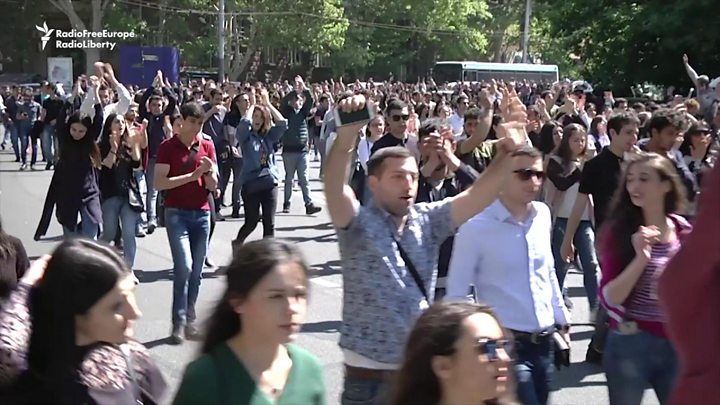
Tens of thousands of opposition protesters have returned to the streets in Armenia despite the resignation of long-standing leader Serzh Sargsyan.
Demonstrators are angry that talks between protest leader Nikol Pashinyan and Mr Sargsyan's replacement as prime minister broke down.
Mr Sargsyan had taken up the post last week after serving as president.
On Wednesday, protesters marched through the capital Yerevan chanting "Nikol for prime minister".
The new President, Armen Sarkissian, has said he will hold talks with political parties to try to resolve the crisis in the country, warning it faces "a serious trial".
Why did talks fail?
Nikol Pashinyan urged people to gather for a rally after his planned talks with acting Prime Minister Karen Karapetyan were cancelled amid disagreement over the format of the meeting.
Mr Pashinyan had been detained briefly during the protests.
There had been scenes of jubilation on Monday after Serzh Sargsyan gave in to the protesters' demand to resign, acknowledging "the street movement" was against his tenure.
He was replaced by Mr Karapetyan, an ally and fellow Republican Party member, who served as prime minister when Mr Sargsyan was still president.
Why was there such a strong opposition to Serzh Sargsyan?
He had previously stated he would "not aspire" to the prime ministerial position but last week he was chosen by parliament for the post.
He served two consecutive terms as president of Armenia - his first began in 2008 and his second in 2013, ending on 9 April this year. Both elections were marred by violence.
In 2015, Armenians voted in a referendum to shift the country from a presidential to a parliamentary system, stripping powers from the president and giving them to the prime minister. The vote was marred by allegations of vote-rigging.
Mr Sargsyan was accused by critics of being overly dependent on Russia and failing to address continuing tensions with Azerbaijan and Turkey, and widespread poverty at home.
His supporters said the tough veteran of the Nagorno-Karabakh war with Azerbaijan provided the national security Armenia needed.
Mr Pashinyan has described his protest movement as another "velvet revolution", referring to the peaceful protests in 1989 that ended communist rule in Czechoslovakia (which later split into two states, the Czech Republic and Slovakia).